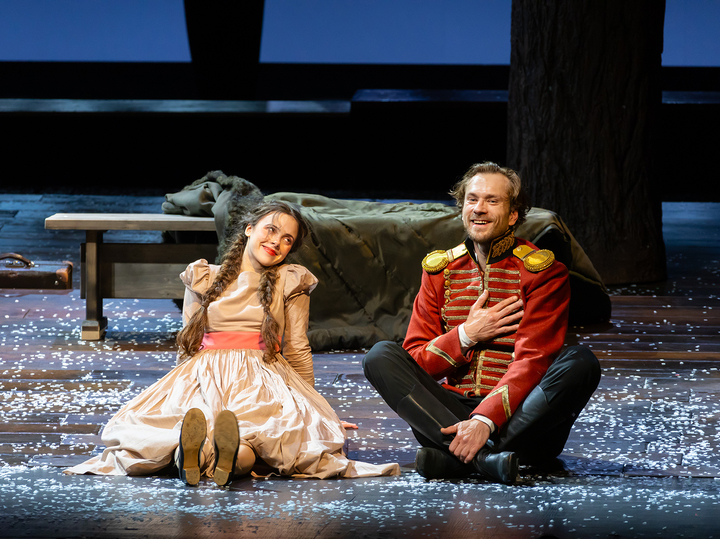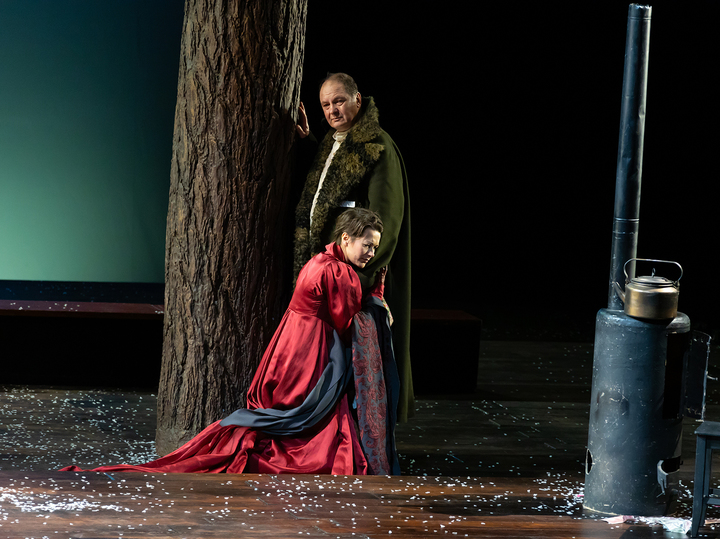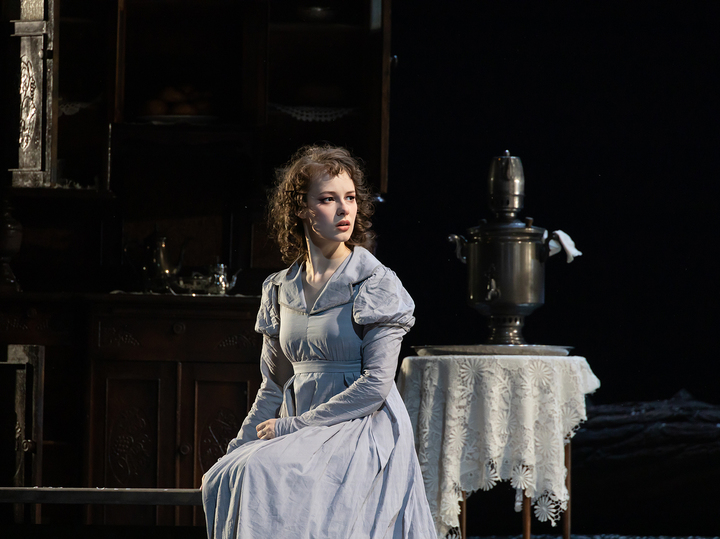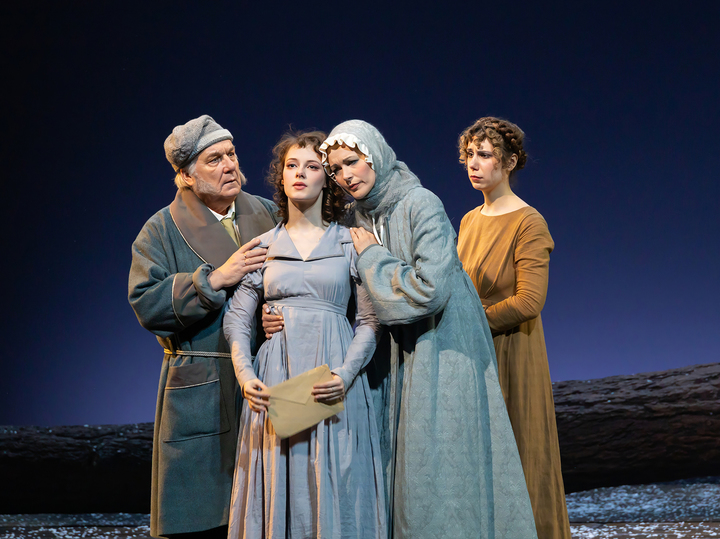Pushkin was generously shown at the Vakhtangov Theater
[ad_1]
Another premiere of Pushkin, who in a couple of months the country will widely celebrate his 225th anniversary, took place in Moscow – at the Vakhtangov Theater. However, “Pushkin’s Tales,” staged by the theater’s chief director Anatoly Shuliev based on “Belkin’s Tales,” can be said to be made both in honor and for the glory of the Sun of Russian poetry. From the premiere show – MK columnist.
On the black curtain, which will not move apart, but will float upward, just above the center it is written in luminous letters of a simple font – “Tales”. There will be four out of five, like the four seasons that will change in three hours on the Historical Stage. And not conventionally, but in all its natural beauty, with the generosity so inherent in Pushkin’s prose – energetic, laconic, rich in images, which in turn give rise to feelings of various properties. But feelings that awaken the mind from sleep.

Shuliev, who last season was noted for the more than successful “Amadeus” with Guskov and Dobronravova in the leading roles, for some reason began his Pushkin epic with the last story – “The Young Lady-Peasant Woman” and with a motley summer. The scale of the production is announced with the very first picture – an open, as if wide-open stage with an uneven and different-level landscape, three powerful trunks of centuries-old pines, whose crowns are hidden somewhere under the grate, sunrises playing with light, followed by sunsets… The only thing missing from the picture that opens is a choir of girls from the opera “Eugene Onegin”: “Girls, beauties, girlfriends…”. Among the three pines, “young life is in full swing” with the sentimental plot of “The Young Peasant Lady,” with which Pushkin, by the way, ends the story of the particularly inconspicuous Ivan Petrovich Belkin, who is a literary mask. But Shuliev has his own plan here, and the logic of his solitaire becomes clear as the action develops, and one season effectively replaces another.

“The Young Peasant Lady” also states that the genre of the production is quite realistic (the girls’ natural sundresses, the firing of rifles and pistols in the hands of landowners and gentlemen officers, the chirping of birds in the awakened forest, and so on). The metropolitan viewer today will be skeptical about this, not finding any new or radical meanings in it. But, firstly, we must say thank you to the young director-in-chief of Vakhtangovsky that he did not load poor Pushkin with what was not contained in him at the time of the creation of the stories in 1830, but left the transparency and purity of the stories, conveying them exclusively through theatrical means. Which, and this secondly, reveals the beauty of the literary work itself, made it alive, today, despite all the realities of the past that exist in them – from social classes to individual words that are now not included in the vocabulary of modern man.
But an important amendment – Anatoly Shuliev is still a student of Rimas Tuminas. And being a good student of the Master, starting from the first sentimental plot, in the following stories he will definitely destroy the real picture. And suddenly, unexpectedly, taking all the expressive means as conspirators – light transitions that are sharp for poignancy (Alexander Matveev), music (Polina Shuliev) and, of course, the scenography of Maxim Obrezkov, whose imagination is greater and richer than any technical tricks of the modern theater.
In any case, the happily ending summer love story of the first story is literally blown away by the autumn leaves that fly in with the wind and bring with it “The Shot.” The anxiety that has replaced the mischievous serenity of the “Peasant Young Lady” will gradually increase tension around the mysterious figure of Silvio, until it suddenly turns into a desperate short dance of the officers, immersed in muted red light. And the mise-en-scene will also quickly return to its calm starting point.
It must be admitted that the destruction of reality also comes from the game. In “The Shot” – from the performer of the role of Silvio – Alexander Gorbatov. He stands out from the rest with his texture (tall, stately, dull strange voice), and with his acting, which seems tough, brittle, but magnetic; in many ways he corresponds to the idea of Pushkin’s character. It is no coincidence that precisely after the “Shot”, which concludes the first act, one of the trees does not fall onto the stage as if cut down, but literally collapses. Falling with a roar, as if in rapid speed, with a characteristic creak of wood breaking from its own weight, it will divide the stage into two parts, becoming a shorthand metaphor in act two. A metaphor for the lost, changed, and not always for the better destinies of the heroes of other stories. Unlike the lovers who so happily united only in “The Peasant Young Lady”…

Loss, separation, chance and its play with people, like a ball, give rise to that same breakdown that is inevitable in everyone’s life. The most striking one will happen in “Blizzard”, the beginning of which is one in one Christmas card: the prosperous family of Gavrila Gavrilovich (Yuri Shlykov) with a peaceful way of rural life, abundantly sprinkled with softly and incessantly falling snow. Even the coachman Timoshka is happy here. The sculptural quality of this and other group scenes is a clear nod to Tuminas, who taught Shuliev the expressiveness of plastic language. And the romanticization of the planned secret wedding of Maria Gavrilovna with Vladimir and the charmingly snowy, like a child’s game, declaration of love will suddenly again capsize into the mystical picture of a wedding with an unfamiliar rake, so similar to a bad dream. Here the director edits two scenes in one scene: a terrible dream turns into a real story about what happened to poor Masha. And she was played by the wonderful Polina Rafeeva in partnership with Dmitry Solomykin without visible boundaries between reality and sleep.
In his performance, Anatoly Shuliev took mainly the actors of the last generation of the Vakhtangov troupe, but so that they did not feel like puppies thrown into the water, he strengthened them with luminaries and experienced artists – Yuri Shlykov, Alexander Ryshchenkov, Anna Antonova – they have charming characteristics built on details images. And Alexander Ryshchenkov in the final story “The Station Agent” also appeared as a touching little man, Samson Vyrin.

In the role of Ivan Petrovich Belkin (in the play he is called the man of the road) – Valeria Ushakov, and this is the only character who passes through all the stories and is actively involved in many roles in them. The performance of Ushakov, a musical actor who is closely involved in the repertoire, is deliberately not flashy, but not devoid of irony: after all, he is on the pitch, and how the game will go depends largely on him, which he begins with Pushkin’s verse, standing in front of a black curtain, and the verse ends – about a young life that will grow. Despite everything and all deaths in spite.
[ad_2]
Source link






